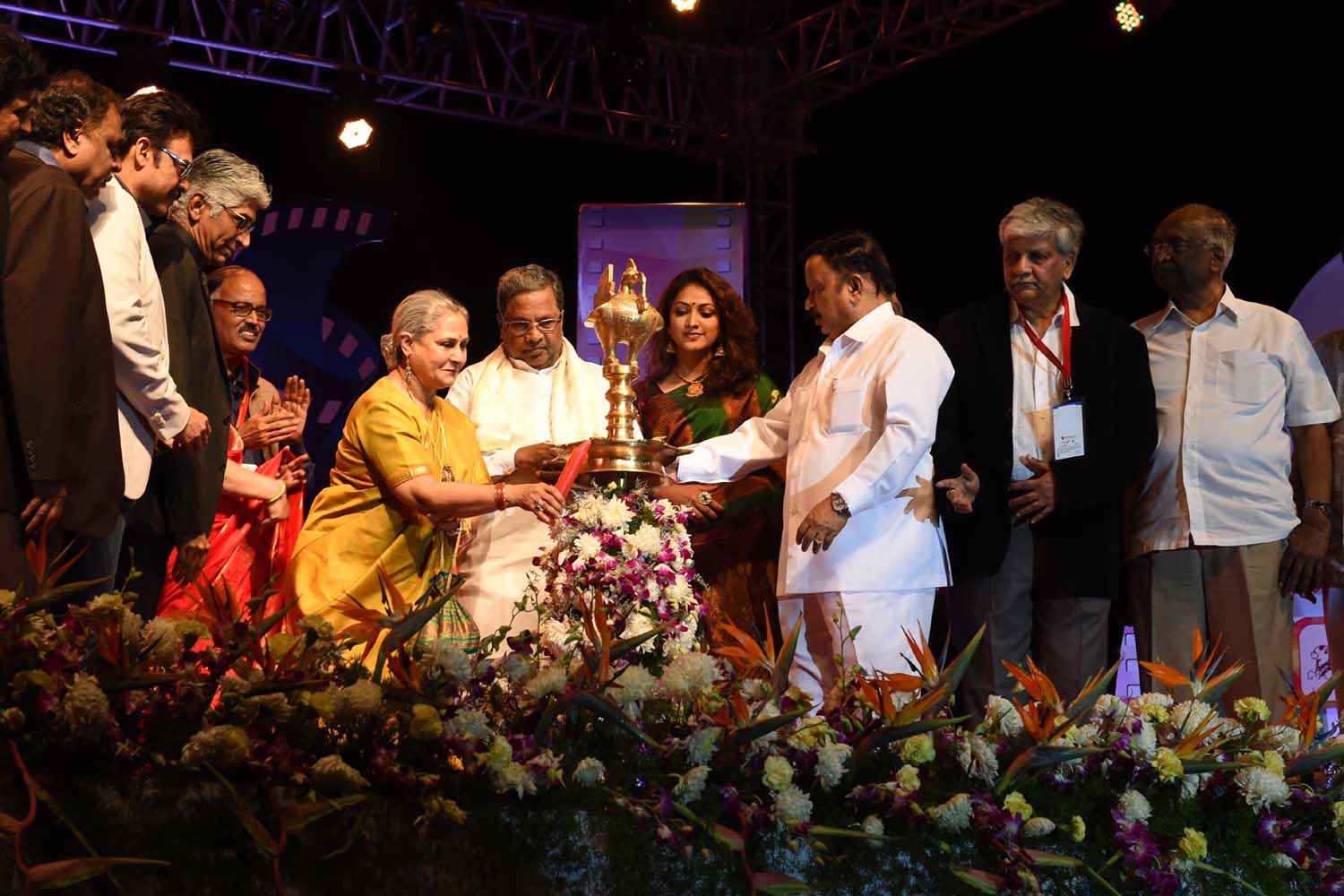India’s Subhadra Mahajan from Himachal Pradesh vies for Proxima Competition honours with her debutant feature Second Chance that brings onto screen the director’s own personal experiences.
With 77th Cannes done and dusted and the sun set on the hubbub and hosannas that resonated the French Riveria’s star-studded skyline, it is now time to say hello Karlovy Vary which is all set to roll its red carpet for the cinephiles of the world next week.
The gala 58th Karlovy Vary International Film Festival, Central and Eastern Europe’s premier cinema carnival, will take centre stage of global spotlight from June 28 to July 6, and, in the fitness of things, one notices that a handful of fascinating films by women film makers make the impressive scroll of 32 curated cinemas that have found official scrutiny.
Comprising of three distinct sections – The Crystal Globe Competition, The Proxima Competition & The Special Screenings – the 58th edition will see a fiesta of films enthralling cine buffs as they gather at the spa town in the West Bohemia region of the Czech Republic, famous for its numerous thermal springs. The riverside spa district is also renowned for several colonnades with columned walkways that should the itinerant tourist as also the diehard film aficionado.
Indeed, what makes KVIFF’s impressive and sumptuous line up interesting, especially for an Indian critic is that, among the 12 films that are in fray in the Proxima Competition, one of them is from the young woman director from India’s Himachal Pradesh – Subhadra Mahajan – cutting her teeth with her first feature Second Chance and hopefully catches the discerning elite jury’s critical eye as well.
After the high that the Indian films and film makers witnessed at the 77th Cannes Film Festival it seems that it is time for Subhadra Mahajan too to follow in the footsteps of Payal Kapadia and bring India the honours from Karlovy Vary.
Mahajan, who has honed her skills with co-writing 2015’s “Angry Indian Goddesses” with director Pan Nalin of Last Film Show fame, has written and scripted the film, which, is said to have been inspired by her own personal experiences.
Second Chance shot in the Pir Panjal range of Subhadra Mahajan’s native State of Himachal Pradesh, is in black-and-white with English, Hindi and Kullavi language spoken. As bespeaks the film’s title, the protagonist Mia, devasted after a traumatic episode, heads to the family’s summer retreat amid the snow-covered Himalayas seeking to recoup her strength, giving herself a Second Chance.
As goes the 104 min film’s synopsis there she finds solace and assurance in the company of the caretaker’s mother-in-law, Bimal, and her grandson, Sunny, which whom she forms a filial bond. This, irrespective of their differing ages, social background and their ideas of happiness.
With Swapnil Suhas Sonawane’s camera capturing the natural landscape and beauty of the milieu the film seeks to address how Mia confronts the painful episode in her life and overcomes the trauma that had left her distraught.
In a statement about her work, Mahajan says “my intention as the writer-director is to have the audiences witness a tale set in a part of the world they have never seen before, but with an emotional crux that they can relate to and leave renewed with the faith at their own personal ‘Second Chances in life.”
Likewise, as Festival Artistic Director Karel Och notes the film festival touches upon a number of themes and genre in the selection, which includes “a freshly revisionist take on the esthetical canons of a period film; a balanced, caring but also provocative look on the fate of a woman in the contemporary society in any moment of her life; and the immediate influence of political events on the life of an individual human being anywhere in the world,” providing for a multifarious narrative and thematic experiences.
In contention for the coveted Proxima recognition from its elite jury comprising filmmaker Mohamed Kordofani, producer Bianca Balbuena, Daniela Michel, founding director of Morelia Film Festival, Wouter Jansen, founder of sales company Square Eyes, and Adéla Komrzý, filmmaker, given Mahajan the women’s company will be Sweden’s VictoriaVerseau with her 72 min docu-feature Trans Memoria.
Verseau, according to film’s synopsis “reveals the joyful aspects and also the dark recesses of transition and, bringing other testimonies into play as well, she critically examines what defines women as women.”
The film, sees Verseau, adopt “an almost archaeological approach to the past and lays bare the process of writing a personal story that is intrinsically linked to the creation of her own identity.”
Also in fray will be Moldova’s Anja Kreis’ 95 min feature Alienated revolving around a philosophy professor Varvara who debates the death of God with her students.
The mystical film touches upon the issue of abortions wherein a girl seeks to abort the child since she believes she is carrying the Antichrist in her womb. In the process raises uncomfortable questions about human conscience, morality and faith, while refusing to provide definitive answers to them.
Italy’s Ivana Gloria’s crisp 75 min debutant foray Chlorophyll(Clorofilla)spotlights on Green-haired Maia, who tiring of her city life decides to spend the summer picking oranges, where she is greeted by the gardener, an eccentric loner called Teo, under whose ministrations she blossoms. Their burgeoning companionship unsettled by the arrival of Teo’s father and older brother Arturo.
The 65 mins documentary from Slovak Republic Lapilli by Paula Ďurinová sees the director set out amongst varied rock formations to try and come to terms with the loss of her grandparents. Different stages of grief unfold among the sea currents, the dark caves and the volcanic wasteland, while the strings of an autoharp resonate in the ravines.
Lapilli finds a unique balance between the personal and the environmental in a modernistic requiem full of perceptive observations on natural phenomena and on man himself, so goes the synopsis.
In the Crystal Globe Competition, of the 12 films in fray, you have Margarida from Portugal with her 127 min feature Banzo backed by a rich repertoire of films before her. Banzo, or slave nostalgia, set in 1907, sees Alonso arrive on Prince’s Island, where he has been tasked with treating a group of workers plagued by a mysterious affliction.
Those affected feel an intense homesickness, fall into apathy, lose the strength to live, and eventually die. The oppressive atmosphere of isolated tropical island forms the backdrop for a story from the dark colonial past in which humanity is put to the ultimate test.
The other contender in the same section is Slovak Republic’s Iveta Grofova’s 129 mins flick Hungarian Dressmaker, which, set in the 1940s, sees the Slovak state witnesses the rise of nationalism and it’s not an auspicious time for minorities.
An adaptation of the novella of the same name by Peter Kristufek, the film captures the turbulent social mood of the times which impacts the widow Marika, who loses her job in an Aryanised dressmaker’s shop.
Given the increasing anti-Hungarian sentiment she shuts herself away, harbouring a little Jewish boy and hounded by two men: a German Nazi officer and Captain of Slovakia’s Hlinka Guard. Conjuring up the dramatic atmosphere of wartime Slovakia, the film speaks of a fragmented era, wherein the protagonists confront complex dilemmas as they fight for survival.
Lilja Ingolfsdottir from Norway brings her 101 min Loveable to the competition arch which spotlights on Sigmund ever away on business while Maria juggles her career with childcare and managing the home.
The film is a searing examination of marital relationships and working couples which results in divorce after the blissful period due to strain on their expectations and demands. Loveableis said to take a fresh exploration on contemporary ideas of romance, equality within the relationship, and the power of womanhood.
Singaporean Nelicia Low’s Pierce, a 109 min feature, focuses on a juvenile delinquent Han released after serving seven years for killing an opponent in a fencing matchmeets his younger brother insisting on his innocence.
Jie believes him, and the fractured brothers’ bond begins to heal. Han helps Jie perfect his fencing skills so that he can qualify for national championships. The gripping atmospheric thriller offers a nerve-wracking duel between ideals of brotherly love and the illusions that we project onto those close to us.
Local girl Czech Republic’s Beata Parkanova’s 74 mins Tiny Lightscentres around Amálka six years old who confronts the harsh reality of the fractured relationships of her parents through the shut door, in this coming-of-age tale, which follows a family break-up as perceived by a child.
Last, but not the least, the Special Screenings section has three films by women director namely In the Land of Brothersfrom Iran, a 95 min film by Alireza Ghasemi & Raha Amirfazli which focuses on Soviet invasion of Afghanistan which led to a massive flight of Afghans to neighboring Iran, which they called the “Land of Brothers.”
The film is a wistful, beautifully shot feature debut by the director duo about a family who will never feel at home in the country where they live, which, incidentally, won over audiences upon its premiere at Sundance.
Marie-Magdalena Kochova Czech fare Other Onesees the director use the character of 18-year-old Johanna to explore the phenomenon of “glass children”– children who, because they have a special-needs sibling, are neglected by their family, however unintentionally, in this docu-feature. The film presents an immensely sensitive account of the nature of sibling love which, for once, puts “the other one” first.
The 90 minute I’m Not Everything I Want to Be(Ještě nejsem, kým chci být) docu-feature from Czech Republic by Klára Tasovská centres on the internationally renowned photographic legend Libuše Jarcovjáková and looks back over the past fifty years at the life of a true icon, known as the Czech Nan Goldin, and this via a fascinating montage of several thousand of her photographs and her diary entries, which she reads out herself.
Other films in fray, by men in business, should surely expect the women to give them a run for the awards each of them is contending. For now, though while the jury is still out there, it is time to dip in and regale in the ensemble sagas that each of these women directors promise will have audiences rooting for them. Prosit!
by

S VISWANATH is a veteran film critic who officiates as JURY at several National & International Film Festivals. He deputises as CHIEF CINEMA CURATOR/PROGRAMMER & CREATIVE ADVISOR for Bengaluru International Film Festival (BIFFes). He also curates & advises on the selection of shorts & documentaries for Bengaluru International Short Film Festival (BISFF). Mr Viswanath is the author of “RANDOM REFLECTIONS: A Kaleidoscopic Musings on Kannada Cinema”.






















Leave a Reply